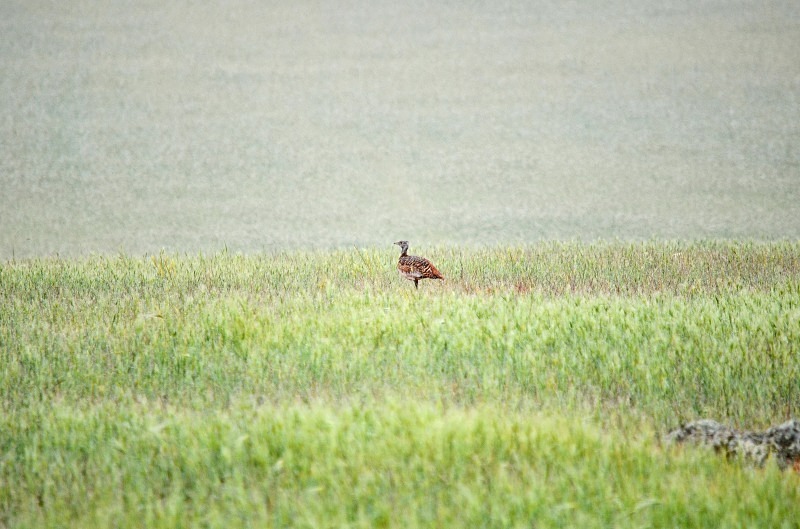Great Bustard

The male Great Bustard is possibly the heaviest bird capable of flight. An adult male typically is over 3 to 3 ½ feet long with a 7 to 8 feet wingspan
An adult male is brown above and white below with a long grey neck and head. The breast and lower neck sides are chestnut. In the breeding season, the male has long white neck bristles. In flight, the long wings show large areas of white. The female is around 30% smaller and lighter than the male.
The Great Bustard breeds in southern and central Europe where it is the largest species of bird and across temperate Asia. European populations are mainly resident but Asian birds move further south in winter. Sizeable populations exist in Hungary, Portugal, Slovakia, Russia and Spain but the species is declining due to habitat loss throughout its range.
The Great Bustard was formerly found in the south of the UK but was hunted out of existence by the 1840s. In 2004 a reintroduction to Salisbury Plain in Wiltshire using eggs taken from Saratov in Russia was undertaken by The Great Bustard Group, a UK registered charity that aims to establish a self-sustaining population of Great Bustards in the UK.
Before mating, the males moult into their breeding plumage around January. Like other bustards, the male Great Bustard has a flamboyant display showing much white, mainly from the undertail, and withdrawing the head. The Great Bustard breeds in March and a single male may mate with up to 5 females.
The Great Bustard is usually found in open grassland although it can also be found on undisturbed cultivation. It has a stately slow walk and tends to run when disturbed rather than fly. It is gregarious, especially in winter.
Date: 26th April 2012
Location: La Serena, Extremadura, Spain
An adult male is brown above and white below with a long grey neck and head. The breast and lower neck sides are chestnut. In the breeding season, the male has long white neck bristles. In flight, the long wings show large areas of white. The female is around 30% smaller and lighter than the male.
The Great Bustard breeds in southern and central Europe where it is the largest species of bird and across temperate Asia. European populations are mainly resident but Asian birds move further south in winter. Sizeable populations exist in Hungary, Portugal, Slovakia, Russia and Spain but the species is declining due to habitat loss throughout its range.
The Great Bustard was formerly found in the south of the UK but was hunted out of existence by the 1840s. In 2004 a reintroduction to Salisbury Plain in Wiltshire using eggs taken from Saratov in Russia was undertaken by The Great Bustard Group, a UK registered charity that aims to establish a self-sustaining population of Great Bustards in the UK.
Before mating, the males moult into their breeding plumage around January. Like other bustards, the male Great Bustard has a flamboyant display showing much white, mainly from the undertail, and withdrawing the head. The Great Bustard breeds in March and a single male may mate with up to 5 females.
The Great Bustard is usually found in open grassland although it can also be found on undisturbed cultivation. It has a stately slow walk and tends to run when disturbed rather than fly. It is gregarious, especially in winter.
Date: 26th April 2012
Location: La Serena, Extremadura, Spain

|















